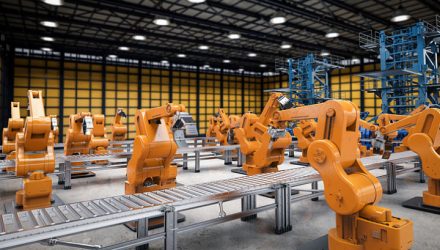The auto industry uses more robots than any other, which help to explain the distribution on the map, but so do the plastic, chemical and pharmaceutical companies. While there are a host of factors that weigh on manufacturing employment, including overseas competition and value of the greenback, Acemoglu and Restrepo ultimately concluded that adding robots to a given area reduces wages and lowers employment.
The predictions of the impact of automation on jobs get more dire. In a December 2016 opinion letter in the Guardian newspaper, world-renowned physicist Stephen Hawking stated “the automation of factories has already decimated jobs in traditional manufacturing, and the rise of artificial intelligence is likely to extend this job destruction deep into the middle classes, with only the most caring, creative or supervisory roles remaining.” The Bloomberg chart below echoes a similar sentiment –
Source: https://www.bloomberg.com/graphics/infographics/job-automation-threatens-workforce.htmlA report from February 2016 authored by Citibank in conjunction with the University of Oxford predicted that 47% of US jobs are at risk of automation within the next 10-20 years. It’s not limited to the US as the same study predicted 35% of UK jobs are at risk, while in China it’s a massive 77% of their population. Across the OECD, the average number of jobs predicted to be at risk is 57%. If this were to occur it likely means significant social dislocations, many of which seem difficult to fathom.
Clearly the impacts of technology, at a quicker pace than many may imagine, may dramatically change the employment landscape. From a sector level, XLK (Technology Select Sector SPDR Fund) may be an ETF that broadly captures this trend. On a more granular basis IGV (iShares North American Tech-Software ETF) may be worth a closer look, as it limits individual security weightings to 8.5% and thus provides diverse exposure to growth oriented software firms, including mid-cap names. For those looking to specifically hone in on robotics, although it currently has lower trading volumes, BOTZ (Robotics & Artificial Intelligence ETF) may warrant consideration.
Hafeez Esmail is the Chief Compliance Officer at Main Management, a participant in the ETF Strategist Channel.
A pioneer in managing all-ETF portfolios, Main Management LLC is committed to delivering liquid, transparent and cost-effective investment solutions. By combining asset allocation insights with smart implementation vehicles, Main Management offers a unique approach that translates into distinct advantages for our clients, including diversification, cost efficiency, tax awareness and transparency. For more information, visit http://www.mainmgt.com.

